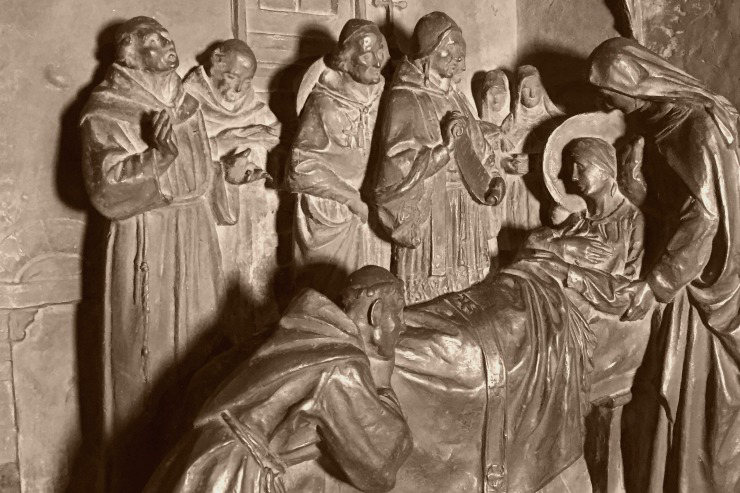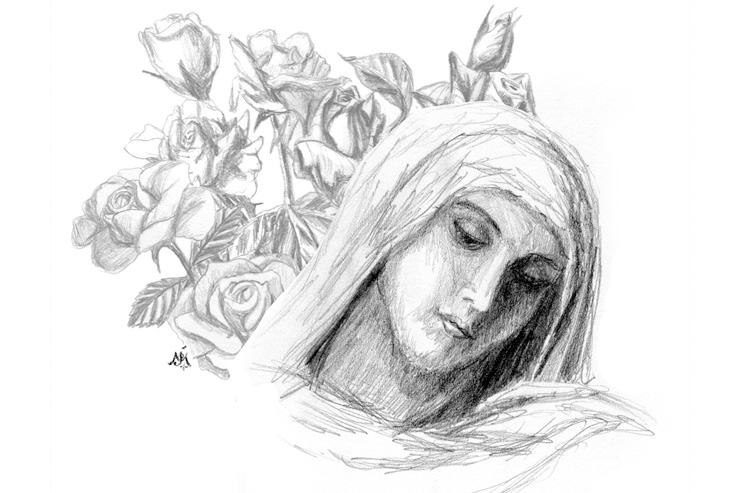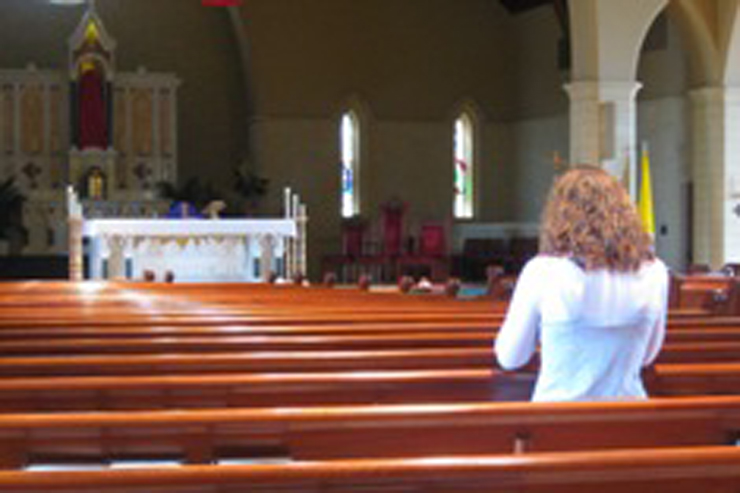
Detail of bas-relief depicting Clare receiving Papal approval of her Order on her deathbed. From the convent at San Damiano
There is a patron saint for everyone—accountants and authors, bankers and bee keepers—and everything—travel and toothaches, Kentucky and kidney stones. So it shouldn’t surprise us that as they became commonplace in homes, Pope Pius XII realized we needed a patron saint of television.
He chose Saint Clare of Assisi, the famous female follower of St. Francis. On Palm Sunday in 1212, Clare snuck out of her father’s home to join Francis’ followers. After cutting her hair and giving her a rough garment for a habit, similar to his own, Francis placed her with a community of Benedictine Sisters. Later, he gave her the church of San Damiano, one of the churches he rebuilt with his own hands, and a community of women gathered around her. They became known as the Poor Ladies of San Damiano. Days before her death, Clare received approval from the Pope for her Order and rule of life, and now there are thousands of Poor Clares throughout the world.
While the Poor Ladies of San Damiano joined in Francis’ mendicant life, meaning that they did not own property and relied on the charity of others to survive, they did not travel as Francis did. Instead the Poor Ladies remained in solitude at San Damiano (and soon other convents as well), dedicating themselves to prayer for Francis and his brothers. To this day, in addition to vows of poverty, chastity, and obedience, many Poor Clares take a fourth vow of enclosure. This vow gives the woman the freedom to live only for Christ. The monastery “is intended to create a space of separation, solitude and silence where God can be sought more freely in a life not only for Him and with Him but also in Him alone” (Verbi Sponsa, no. 5).
So you might now be wondering… why is a cloistered nun the patroness of television?
One Christmas, Clare was too sick to get out of bed to join her fellow sisters in praying the Divine Office. When her sisters went to Matins in the middle of the night, God gave her a miraculous vision, where she was carried to the new church of St. Francis and was able to experience the liturgy with the friars there. When her nuns returned to her bedside, they lamented that she had not been able to join them. She reassured them that she had been given an even greater gift.
“Praise and glory be to our Lord Jesus Christ, the blessed one, my beloved sisters and daughters; for I have not only assisted at all the solemnities of this most holy night, but I have experienced in my soul even greater consolations than those which have been your share; for by the intercession of my father, St. Francis, and through the grace of our Savior Jesus Christ I have been personally present in the church of my venerable father, St. Francis, and with the ears of my body and those of my spirit have heard all the Office, and the sounds of the organ, and the singing, and have likewise received there the most Holy Communion. Rejoice, then, because of these graces which I have received, and return to thanks to our Lord Jesus Christ” (From the Little Flowers of St Francis, XXXV).
The word “television” means to see at a distance, and because of this vision, Pius decided she was the perfect patroness for the invention. Fittingly, it was a Poor Clare nun—Mother Angelica—who began bringing the Mass into the living rooms of millions around the world; not through a miraculous vision from God, but through the Eternal World Television Network, founded in 1980 in Alabama.
In our modern day, when television can often be the vehicle for programming that offends God and His Church, may we remember the potential goodness which can be brought by television and other forms of communication. Through the intercession of St. Clare, may we be given the prudence to know how to use these tools for the good, and the fortitude to stand up against the things that threaten our children and our peace.
St. Clare, pray for us!















